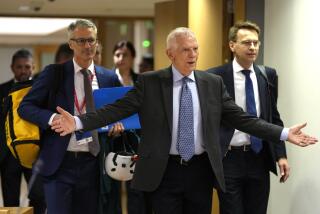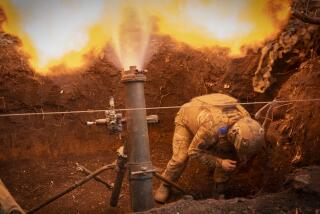Europe may face pressure to impose tougher sanctions on Russia
After being half a step behind the United States for months, Europe is likely to come under heavy pressure to impose stronger sanctions on Moscow if convincing evidence emerges of a Russian link to the downing of the Malaysia Airlines jetliner.
Earlier this year, the European Union joined the U.S. in slapping financial and travel restrictions on selected Russian officials and companies after Moscow’s annexation of Crimea. But Washington’s sanctions, including new ones unveiled this week, have gone further than those of the EU, which has struggled to maintain a tough line against Moscow because of some member countries’ close trading ties with Russia.
But proof of what some Western officials are alleging – that either pro-Russia rebels in eastern Ukraine or the Russian military itself was involved in the missile strike on Malaysian Airlines Flight 17 – would be a potential game-changer. At that point, reluctant European countries such as Italy and Spain would be hard-pressed to argue against adopting more punitive measures against Moscow.
“There’s really been no repercussions so far for Russia apart from the U.S. stepping up sanctions. The urgency will go up significantly for Europe after this event,” said Sarah Lain, an expert on Russia at the Royal United Services Institute, a London-based security think tank.
If the EU fails to issue a strong response in the face of evidence implicating Russia in the plane crash, “it’ll damage Europe’s reputation internationally, because it’ll come off as completely weak and ineffectual,” Lain said. “At the same time, it’s a very complex issue, because each European country has different economic things at stake in terms of dealing with Russia.”
Italy, for example, enjoys warm relations with Moscow and has resisted imposing stiffer penalties. France has gone ahead with a $1.6-billion deal to sell Russia two advanced warships, an agreement that critics are urging Paris to rethink.
Business leaders in Germany, Europe’s biggest economy, have lobbied the German government not to adopt tougher sanctions on Moscow. Some European nations are heavily dependent on Russian gas.
On Friday, several European leaders expressed outrage over the downing of the Malaysian airliner but have so far refrained from blaming Russia outright, calling for a full and independent investigation into the catastrophe.
“We will turn every stone, and if it becomes clear that this was an attack, I will be personally responsible for guaranteeing that the people responsible will be determined. That’s what we owe the innocent victims and their families,” Prime Minister Mark Rutte of the Netherlands told reporters at The Hague. The majority of the 298 victims aboard the doomed plane were Dutch.
Rutte said Russian President Vladimir Putin had assured him in a phone call that Moscow backed an international investigation into the crash.
Britain and some Eastern European nations such as Poland have been among the EU’s 28 members pressing for tougher action against Russia over the conflict in eastern Ukraine between the Ukrainian government in Kiev and pro-Russia separatists.
Mark Lyall Grant, Britain’s ambassador to the United Nations, came close to accusing Moscow of complicity in the jetliner crash in a forceful statement at an emergency meeting of the U.N. Security Council on Friday.
“This is a dark moment for the international community. The senseless violence unleashed by armed separatists in eastern Ukraine has reached monstrous proportions,” Lyall Grant said.
He noted that pro-Russia rebels in eastern Ukraine had previously “claimed responsibility for, indeed gloated publicly over” having shot down Ukrainian military aircraft in the same area.
“We know that weapons, equipment and logistical support have been systematically provided to armed separatist groups by Russia,” Lyall Grant said. “The United Kingdom urges Russia to reflect carefully on the situation they have created….Let us hear today clear and unequivocal condemnation from Russia of the actions of these armed groups.”
More to Read
Start your day right
Sign up for Essential California for news, features and recommendations from the L.A. Times and beyond in your inbox six days a week.
You may occasionally receive promotional content from the Los Angeles Times.







